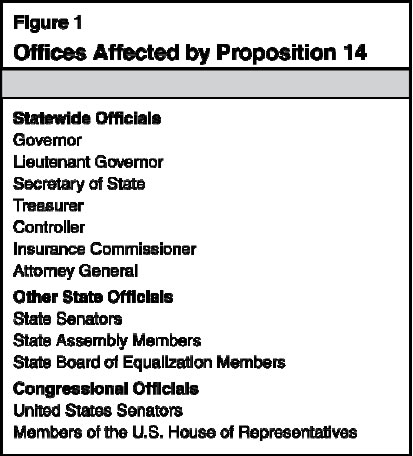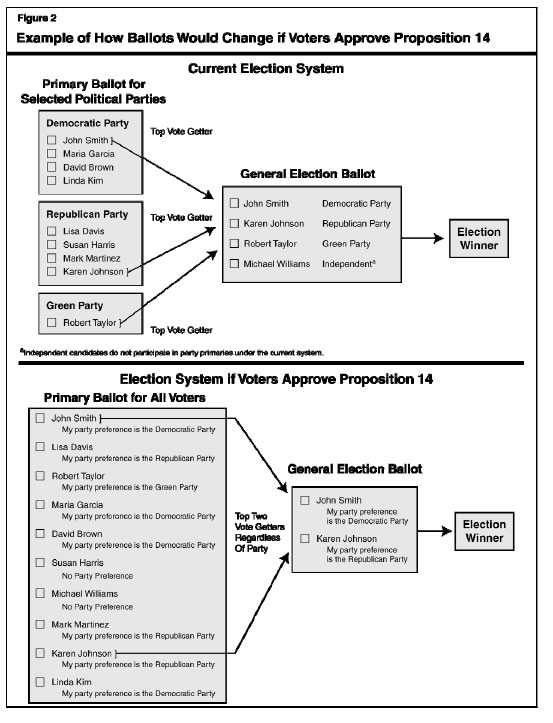Submitted February 18, 2010
Proposition 14
Elections: Open Primaries.
Summary of Legislative Analyst’s Estimate of Net State and Local Government Fiscal Impact
-
Fiscal Impact: No significant net change in state and local government costs to administer elections.
Yes/No Statement
A YES vote on this measure means: All voters would receive the same primary election ballot for most state and federal offices. Only the two candidates with the most votes—regardless of political party identification—would advance to the general election ballot.
A NO vote on this measure means: Voters would continue to receive primary election ballots based on their political party. The candidate with the most votes from each political party would continue to advance to the general election ballot.
|
Background
Primary and General Elections. California generally holds two statewide elections in even-numbered years to elect candidates to state and federal offices—a primary election (in June) and a general election (in November). These elections (such as those for Governor and Members of Congress) are partisan, which means that most candidates are associated with a political party. For these partisan offices, the results of a primary election determine each party’s nominee for the office. The candidate receiving the most votes in a party primary election is that party’s nominee for the general election. In the general election, voters choose among all of the parties’ nominees, as well as any independent candidates. (Independent candidates—those not associated with a party—do not participate in primary elections.) The winner of the general election then serves a term in that office.
Ballot Materials Under Current Primary System. For every primary election, each county prepares a ballot and related materials for each political party. Those voters affiliated with political parties receive their party’s ballot. These party ballots include partisan offices, nonpartisan offices, and propositions. Voters with no party affiliation receive ballots related only to nonpartisan offices and propositions. Parties, however, may allow voters with no party affiliation to receive their party’s ballot.
Partisan Statewide Elections in California. Partisan elections for state office include those for the Governor, Lieutenant Governor, Controller, Secretary of State, Treasurer, Insurance Commissioner, Attorney General, the 120 members of the Legislature, and four members of the State Board of Equalization. (The Superintendent of Public Instruction is a nonpartisan state office.) Partisan elections also are held for federal offices including President, Vice President, and Members of Congress.
Proposal
This measure, which amends the State Constitution, changes the election process for most state and federal offices. Its provisions and related legislation would take effect for elections after January 1, 2011.
Creates a Top-Two Primary Election. This measure creates a single ballot for primary elections for those congressional and state elective offices shown in Figure 1. Candidates would indicate for the ballot either their political party (the party chosen on their voter registration) or no party preference. All candidates would be listed—including independent candidates, who now would appear on the primary ballot. Each voter would cast his or her vote using this single primary ballot. A voter registered with the Republican Party, for example, would be able to vote in the primary election for a candidate registered as a Democrat, a candidate registered as a Republican, or any other candidate. The two candidates with the highest number of votes in the primary election—regardless of their party preference—would advance to compete in the general election. In fact, the two candidates in the general election could have the same party preference.

Figure 2 illustrates how a ballot for an office might appear if voters approve this measure and shows how this is different from the current system.

Does Not Affect Presidential Elections and Political Party Leadership Positions. Under this measure, there would still be partisan primary elections for presidential candidates and political party offices (including party central committees, party officials, and presidential delegates).
Fiscal Effect
Minor Costs and Savings. This measure would change how elections officials prepare, print, and mail ballot materials. In some cases, these changes could increase these state and county costs. For instance, under this measure, all candidates—regardless of their party preference—would be listed on each primary election ballot. This would make these ballots longer. In other cases, the measure would reduce election costs. For example, by eliminating in some instances the need to prepare different primary ballots for each political party, counties sometimes would realize savings. For general election ballots, the measure would reduce the number of candidates (by only having the two candidates who received the most votes from the primary election on the ballot). This would make these ballots shorter. The direct costs and savings resulting from this measure would be relatively minor and would tend to offset each other. Accordingly, we estimate that the measure’s fiscal effects would not be significant for state and local governments.
Indirect Fiscal Effects Impossible to Estimate. In some cases, this measure would result in different individuals being elected to offices than under current law. Different officeholders would make different decisions about state and local government spending and revenues. These indirect fiscal effects of the measure are unknown and impossible to estimate.
Return to Propositions
Return to Legislative Analyst's Office Home Page